With its range of foreign cuisine almost to the total exclusion of any native offering, Box Park adheres fully to the metropolitan multicultural mindset that extols a vast selection of international food as though it was one of the foremost purposes of life. In London, there are Box Park sites at Shoreditch (the first ever Box Park opened there in 2011), Croydon, Wembley, and Camden. One is in Liverpool. One in Birmingham is coming soon.
Afghan Caravan, Curry on Naan Stop, Bao Bao Taiwanese Street Food, Thai Express UK, Wok, Kanji, and The Argentine Grill, are just some of a large number of foreign food outlets sitting along the perimeter of Box Park Coydon. Consumers eat and socialise in the centre. Only white font showing shop names distinguishes black cookie-cutter slots sitting inside a giant black eyesore of a shipping container structure. More vapid surroundings one would struggle to find.
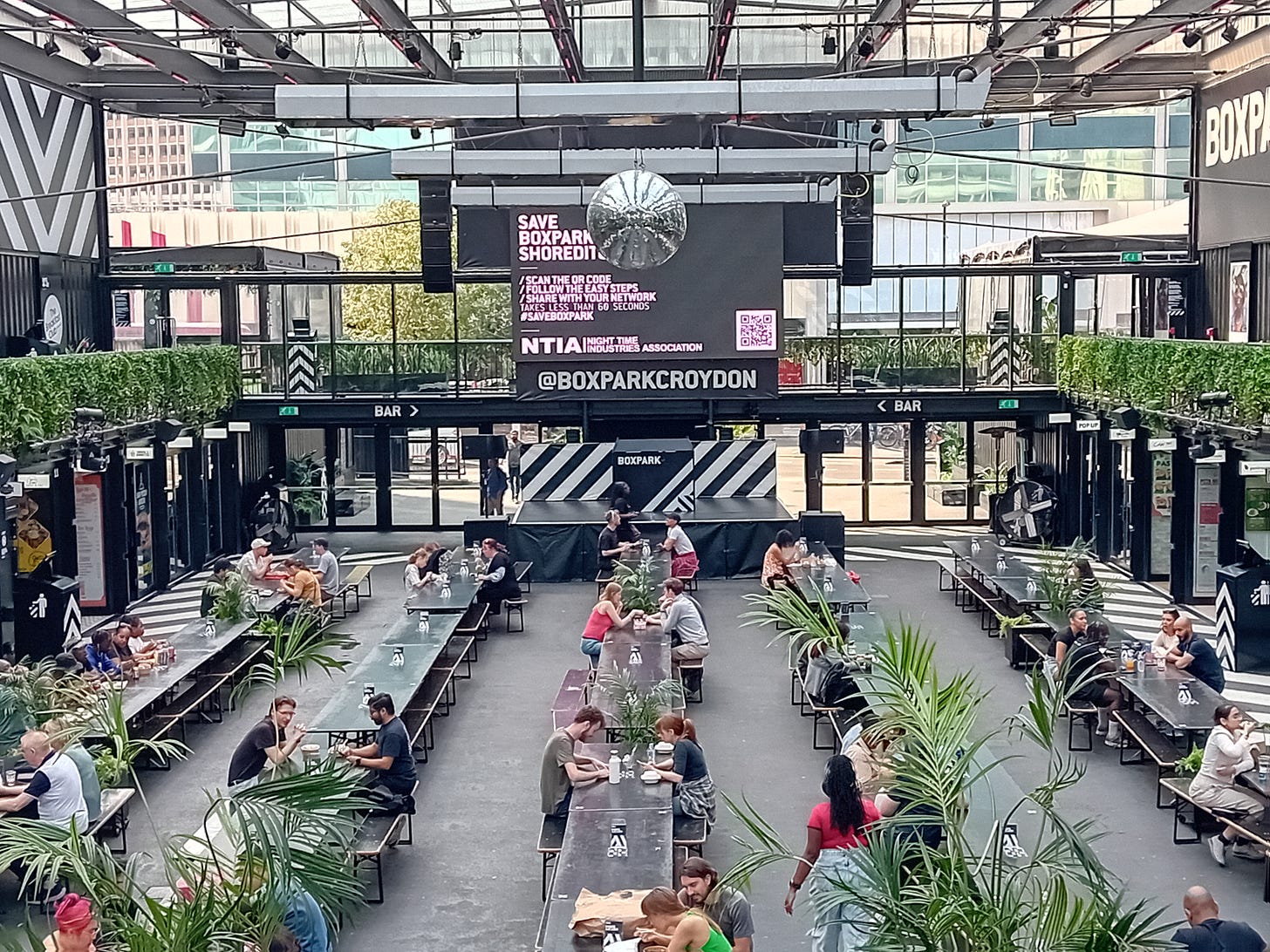
The whole operation is a flagrant counter signal to organic English and British culture—a giant middle finger.
Despite the many reasons for an aversion to it, Box Park has some aspects to offset its terrible features, and it inspires something far greater than the complex. We will get to this. First, it’s worth outlining its anti-native raison d'être. Its global lefty cultural orientation is indicated not only by the emphasis on foreign cuisine. The Box Park website advertises events at its sites in London and Liverpool. ‘LOUD LDN is a collective of women and non binary musicians, singers, songwriters and artists’, and ‘LOUD LDN has made a name for itself as a friendly, fun, community, aiming to help uplift woken and non binary musicians.’ Why men must be excluded from a musical community is not stated. Yemaya Collective Soul Nights is described as ‘A night of Soulful music and Networking for POC.’ POC is an acronym for people of colour, in case you are not sure. So, we have no whites welcome shindigs. On September 5th, ‘Funke Fiesta’ starts ‘celebrations of Brasil Independence Day weekend’. They will do nothing for St. George’s Day. At Amapiano Thursdays, ‘You can expect the hottest sounds straight from South Africa as well as Amapiano classics’. Hip-hop karaoke and salsa dancing feature regularly. There is the odd pop theme event and a Taylor Swift one too. Still, Box Park has a decidedly non-white orientation. The whole operation is a flagrant counter signal to organic English and British culture—a giant middle finger. White men barely register a presence on their website. White women feature, as do ‘‘people of colour,” in an arrangement that evokes typical adverts on British TV today.
Its unappealing features aside, conceptually, there is some merit to Box Park. Having a variety of food in the same complex can be convenient, particularly if you are on a night out with a group of friends and everyone wants to eat different things and sit together. The Shoreditch and Croydon venues have some shops on offer, which is a good idea. When thinking about my dislike of Box Park while remaining mindful of its attractive conceptual aspects, I began to imagine. I began to imagine what could be an enchanting locus. Imagine an area with roughly the same amount of space, layout, and a similar partitioning of outlets as Box Park. Imagine the building was not comprised of shipping containers but made of something pleasing to the eye. Imagine if businesses on the premises adhered fundamentally to maintaining and promoting an authentic British character and interest. I have imagined this; I will call it Box Britain, for now.
Welcome to Box Britain
The picture below shows a typical Box Park unit. As you can see, the shop is small and conveys the size of the outlets in mind for this project. Box Britain more or less adheres to this plan but not the colour scheme or presentation.
Scotch Egg
Various origin stories exist for the Scotch egg. One claims its invention by the London department store Fortnum & Mason in 1738. The first printed recipe for the food is credited to Maria Rundell’s A New System of Domestic Cookery, 1809. For readers overseas who might not have ever eaten or seen this snack, a scotch egg is a boiled egg wrapped in sausage meat, coated in breadcrumbs, and baked or deep-fried. It is sold in most supermarkets and is a regular pub or picnic snack usually eaten cold or at room temperature.
The image above is of a traditional Scotch egg, and there are other variations. The Manchester egg is a pickled egg wrapped in pork meat and black pudding. Great British Chefs list recipes for versions involving haddock, cod, haggis, lamb, quail, and venison. Sauces including mustard, pickle, and ketchup accompany it. It can form a part of salads and go with cheese, pickled onions, chips, and mashed potatoes and beans.
Scotch Egg is the name of one shop inside our imagined Box Britain. This outlet sells a variety of scotch eggs and meals as described above. It has a small range of domestic beers and soft drinks on offer and focuses on lunch and dinner meals. Cheeses and jars of pickle can be bought. The Scotch Egg, like every other outlet at Box Britain, is not operated by effete hipsters who will charge outrageous prices for tiny portions. It's marketed to those willing to spend between £5-10 on a lunch and not much more than £15 on a dinner. Rows of scotch eggs and cheese are neatly displayed to entice customers. A giant Scotch egg is on view outside the door and is somewhat of a cultural landmark. The colour scheme of the unit reflects the appearance of a Scotch egg.
Greasy Spoon
Next door we have the Greasy Spoon. It takes its name from the epithet affectionately given to your typical no airs, no graces, no fuss working-class English cafe where builders and other workmen receive a filling meal and a hot drink at a low price. No avocado on toast here. In the window at the front, a model of a disproportionately large ‘‘greasy spoon’’ humorously nods to the cafe’s name. The unit has no windows at its rear or on either side, but faux windows give customers the illusion of daylight pouring in at the side of the shop. The man in the picture below has found one of a small number of seats inside.
The Greasy Spoon attracts customers with its no nonsense menu containing a Full English breakfast, burger and chips, omelettes, egg or beans on toast, and sandwiches including bacon, egg, sausage, etc. It is everything you would expect from the typical cafe on a main road where the builder has a builder’s tea. It is open early every morning to catch those keen to eat before work and closes late so it can serve dinner. Prices start from about three quid for a sandwich, and you are unlikely to spend more than a tenner here. The unit appears as a typical, albeit small cafe, from the outside.
To put it mildly, the units of Box Britain outlined so far are not likely to do much good for your waistline; standing next to the Greasy Spoon, the Salad Bar countervails this. Its presence politely reminds patrons of the Greasy Spoon to consider whether they need to lose weight or take the odd day off eating in the cafe.
Salad Bar
According to the Nosey Chef, ‘In the period from 1940s’ wartime ‘dig for Britain’ allotments and the 1990s, lettuce were the only green salad leaves generally available to the British.’ ‘This is where the classic English salad comes from. Dad would lift a lettuce from the garden, and this would be dressed up with a range of immovable accompaniments including tomatoes, cucumber, radish and boiled eggs. The whole thing would be spooned over with Heinz Salad Cream.’ This sounds like a pleasant meal, but the Salad Bar has a lower calorie sugar free alternative to Heinz Salad cream.
The wall showing vegetative imagery and the mixture of vegetables and flowers suspended above the counter give the place a lush style and help to form a bright, pleasant ambience. Plants sit along the perimeter of the shop, and the few tables in the unit each have a pot of flowers. It smells fresh and beautiful. Foreign salad styles are not excluded, but there is an emphasis on more native salads and ingredients. Meals include English garden salad and other options with or without meat or fish. Prices range between £5-20 for lunch and dinner meals.
Haggis
Haggis sits next to the Salad Bar and sells ‘haggis with neeps and tatties’. The dish comprises sheep lungs, liver, heart, suet, oatmeal, onion, salt, and spices. It is quintessentially Scottish and said to be of ancient provenance. In addition to the traditional version, varieties including pork, venison, and beef are sold. Whisky sauce is always on hand. All of the ingredients come from Scotland. The staff often wear kilts, and the unit is unmistakably Scottish. A shelf on the approach to the counter features a range of Scottish whiskeys. Ales, beers, and soft drinks, including Irn Bru, are on a shelf opposite. The display is as much intended to create an appealing visual experience as to provide customers with a wide choice. Through the window to the store a saltier, a kilt, and an assortment of Scottish nickknacks are on show. Price range: £10-25 for lunch and dinner meals. The unit has a tartan colour scheme.
Peace and Quiet
A tendency to facilitate a tranquil reading experience is often what makes one coffee shop preferable to another. In public spaces, we are at the mercy of others. In a healthy social environment, strangers can see someone reading a book and appreciate their need for peace and quiet. Out of politeness, they may then sit a considerable distance and keep their voice down if talking. Unfortunately, some people are not so amenable. On occasion, I have heard people playing devices aloud in communal seating areas and speaking in a needlessly loud manner. Peace and Quiet is an antidote to such rudeness. The venue has a strict noise policy. It comprises four units, joined together to accommodate more people than your typical Box Britain store. The unit assumes the form of a living room to encourage comfort, calm, and relaxation. It serves tea and coffee, some salads from the Salad Bar, and sandwiches. The entrance door remains shut when not in use, and the shop has soundproof walls, so the bustle from outside does not intrude. You can spend anywhere between £2-20 here. Some books and teapots are on display in the window.
Baz and Dave
Like Box Park, outlets at Box Britain operate takeaway deliveries. Unlike Box Park, Box Britain does not use Deliveroo or Uber Eats. Instead, we have Baz and Dave bringing you your food. See their logo below.
The potential for a complex of native food and drink outlets with a distinctive artistic presentation is clear. From a business perspective, they are no less practicable than what is in Box Park.
While Box Park does offer choices—ideologically motivated choices—their venues and units are visually dispiriting nondescript monuments to monotony.
The picture of Box Britain is not yet complete and requires a second article. Much remains to be told. Box Park Wembley, the largest one, has thirty retail units. I will not list that many. The space allocated to Peace and Quiet takes the total number of units at Box Britain mentioned to eight. In part two, I will perhaps envision enough shops to raise the total to somewhere between fifteen and twenty units. If you like tea rooms, ploughman’s lunches, and traditional pubs, you will likely find something to appreciate as Box Britain fully manifests. Questions relating to daytime and nighttime activities and events will be answered. The reason for detailing the price range of each shop will be made clearer. The broader colour scheme and branding of the complex will be decided too.
HERITAGE, HISTORY, CULTURE
The images of the Box Britain outlets noted in this piece were generated by Microsoft Bing AI.
References
https://boxpark.co.uk/
https://en.wikipedia.org/wiki/Boxpark
https://noseychef.com/2020/05/20/english-salad
https://www.turnbullsfood.co.uk/blogs/news-1/the-scotch-egg-story
https://www.bbcgoodfood.com/recipes/english-garden-salad
https://www.bbcgoodfood.com/howto/guide/what-haggis




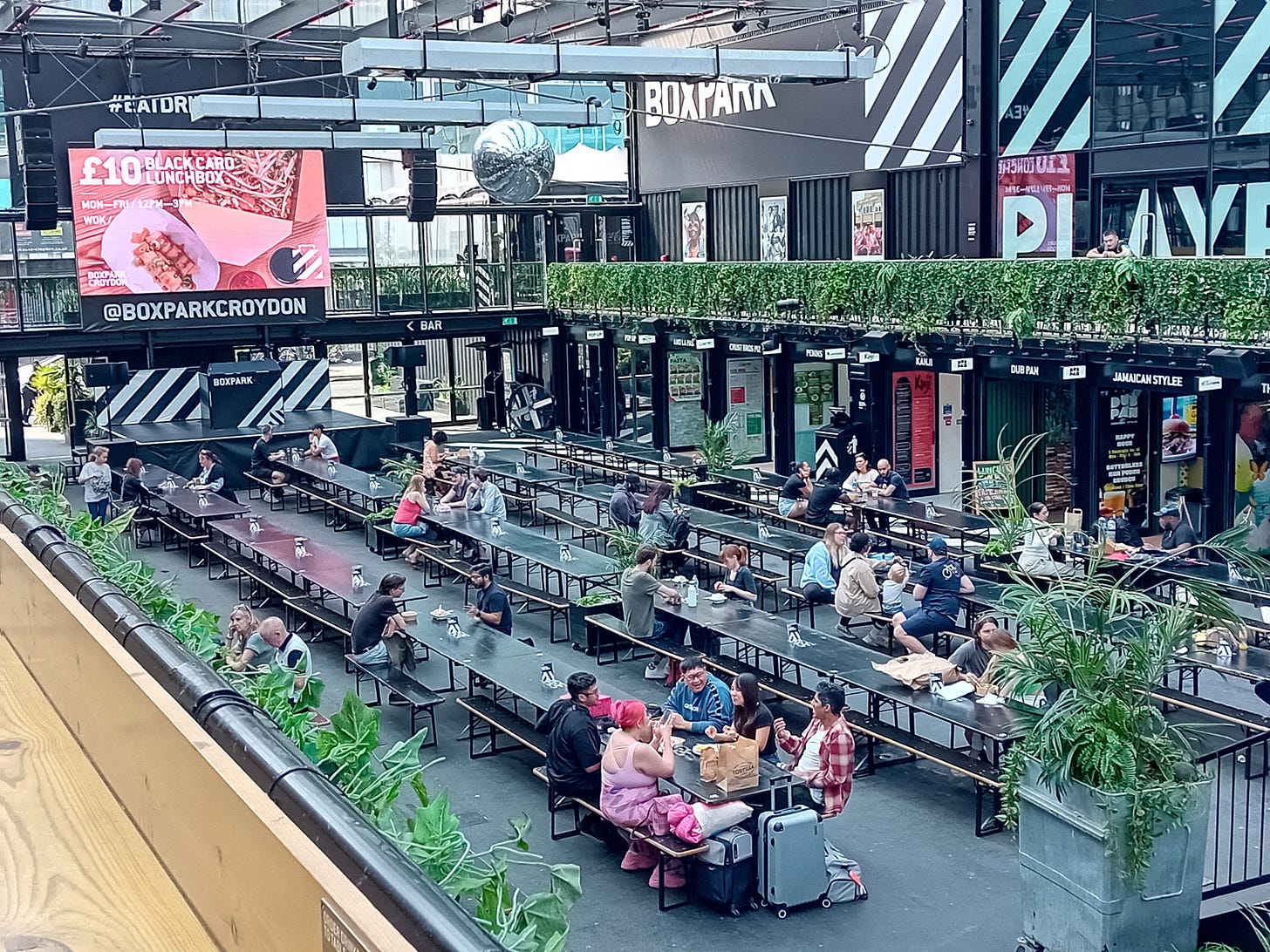
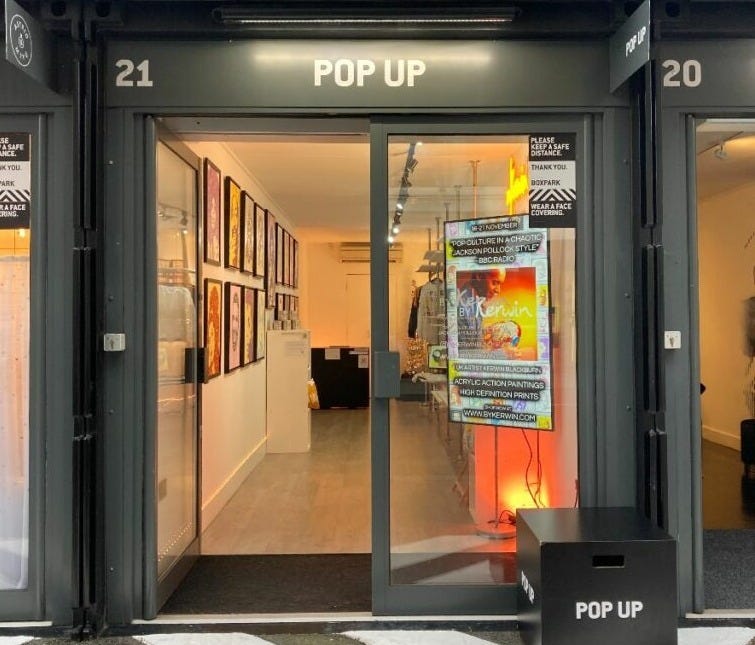

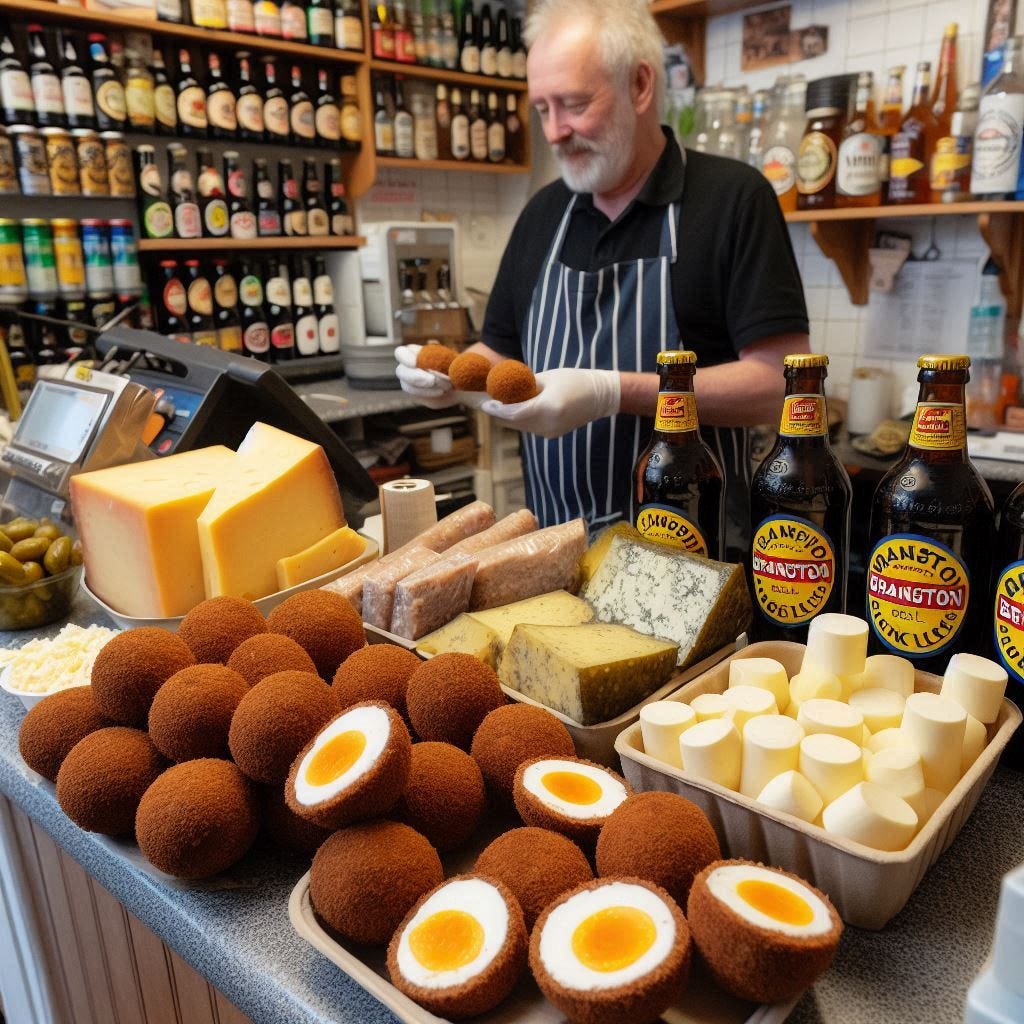
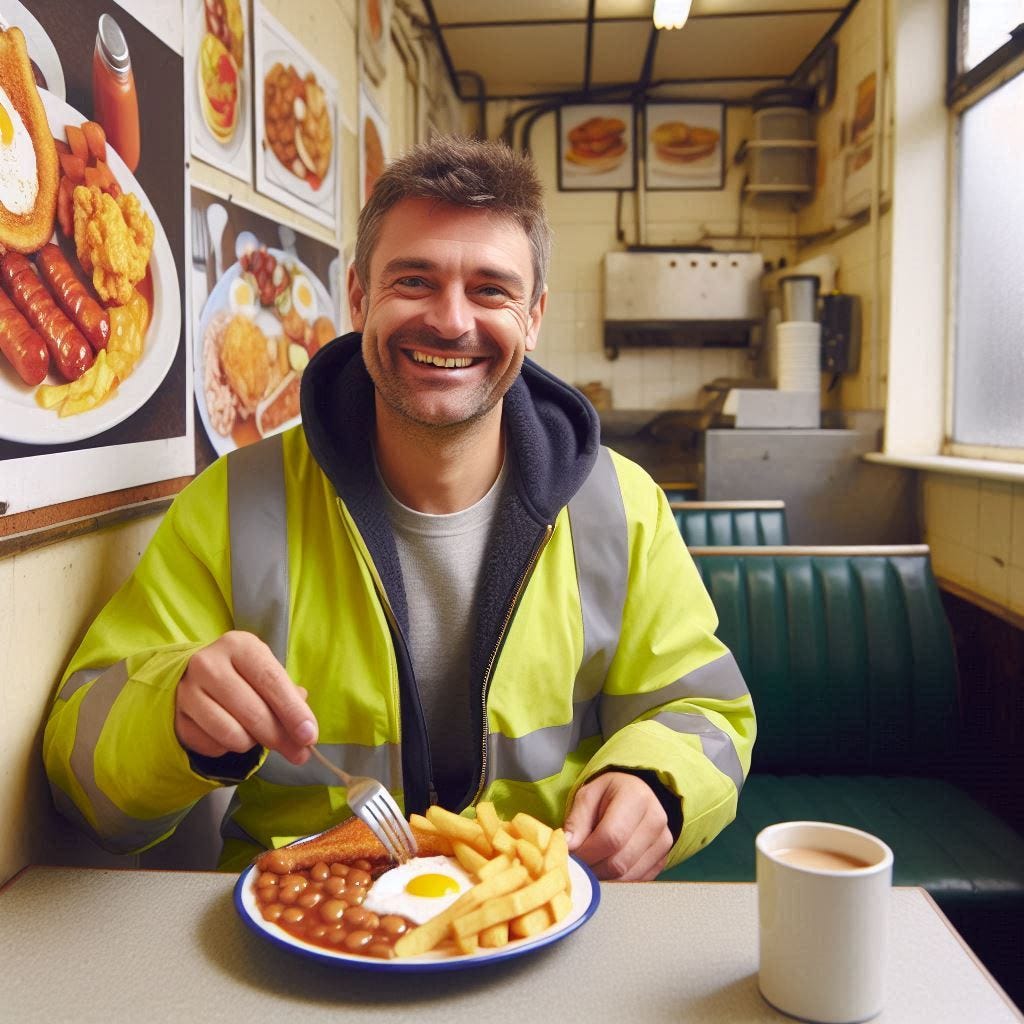




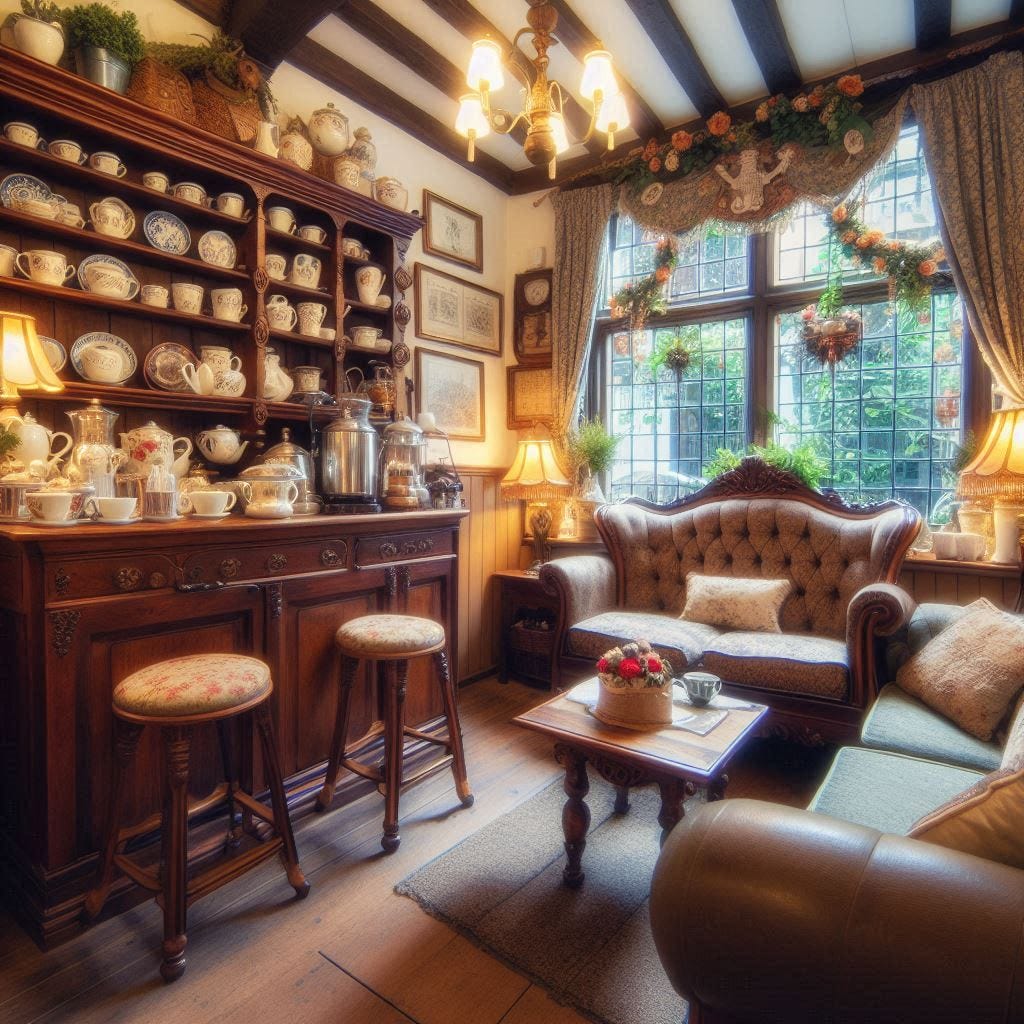

I'm of the opinion that a place selling pies, pasties and sausage rolls would do good business on Friday and Saturday nights in demographically sound towns. It could have discreet signage confirming that nothing contains halal or kosher meat and should be reasonably priced.